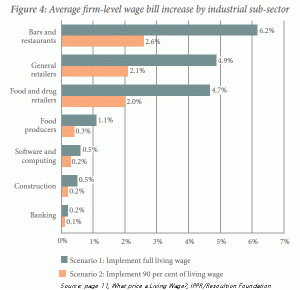After discussion of one free-marketeer wide-boy enthusing over the principles of economic self-sufficiency in which his workforce is paid the least he can get away with legally or practically whilst relying on a work-base trained at someone else’s expense, I see Left Foot Forward is cogitating on the living wage; which, depending on the area of the country, between £1 and £2.20 more per hour than the minimum wage of £6.08 per hour
Organized according to sector, the included graphic projects the percentage increase of the wage bill for companies implementing a living wage. A clear conclusion to take from this is that sectors more likely to acrue a higher percentage rise (and, therefore, be more likely currently to be paying a high proportion of their staff at or near the minimum wage) also are likely to be retail and consumer driven.
A suggestion the piece author makes is that this presents an opportunity for consumer pressure. The relative merits and/or demerits of fair trade and organic produce form part of a wider discussion, yet consumer demand for compliant products has persuaded many companies in the retail and hospitality sectors to expend time and money in providing access to them: resulting in what is now a side-line worth hundreds of millions or even billions. In addition, the highly narrow niche interest of consumer demands such as kosher accredition in the UK has not stopped large companies such as Kellogs or PG Tips or Hovis accommodating them.
Just as failed mayoral candidate and nomadic factory owner, Tony Caldeira found when more than one employee whom he was paying £6.08 readily departed to another local company paying near or above what has been determined to be a living wage, so too could consumer pressure encourage PR-minded companies to invest in above-than minimum wage.
Update: as said by SarahAB BtL, a still more direct route to improved pay/conditions might be the partnership model, e.g. John Lewis.



